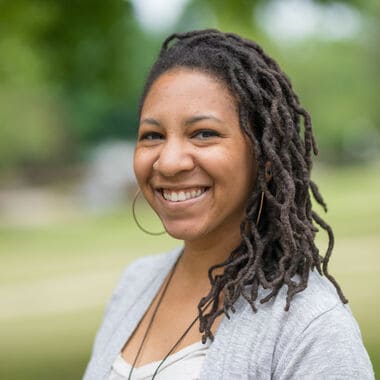Now I really started to, to think a little bit differently in college about the, the kind of impact that I wanted to have through my work. I will say that my time in Teach for America continues to stay with me and stay relevant through all of the work that I've done. My name is Kirby Broad and I am currently doing a couple of things for work. Um, I am a contract worker with an organization that does civic engagement work, um, facilitating a new program, working with, um, people who are doing transformational work in their communities. And I also work part-time as a patient advocate. I had an experience taking, um, it was a required course that I had to take for the, the hall that I lived in at school. And that course was the first time that I'd had really in depth kind of critical conversations about social issues. I learned about, um, systems of oppression, social structures that really helped me to understand my own experience, put my experience in a larger context, um, and just really helped me to make, um, sense of the world in, in a, in a different kind of way by virtue of studying some of these, you know, social systems. Um, you know, understanding issues plaguing, you know, our society, our culture, country, the and beyond. It got me thinking about how I might contribute to a, a better world for myself, for people that I care about. You know, for all of us, teaching was one of the hardest jobs that I had to this day. Um, and I was so worried about, you know, like, oh my gosh, I'm the only fifth grade teacher, I'm the only kindergarten teacher. These kids are gonna have, like, I gotta get this right. You know, just putting a lot of pressure, um, and wanting to really do well by them. You know, they deserve it and they need it. And so just really working so hard to do the best I could to this day. I use what I learned about lesson planning and backwards planning within a lesson plan, um, or just in general. And so it really built up this practice of thinking in that detailed way through what was the lesson gonna be and what were the necessary components. And I have used that idea of thinking backwards. Like what is, what is, where are we trying to get to? Where are we trying to get to? are we trying to get to and what are the things that we then need to do in order to get to that point? And I also use this idea in my facilitation work as a consultant, I do a fair amount of, um, facilitation planning. And if I'm working with a client and they, you know, they say This is where we hope to be, I'm able to ask some different kinds of questions to help them and myself get clear about the goals for, for our time together. I always felt like I had the support that I needed and that really shaped my ability to, to stick with the program through the challenges. I also try to be honest with people that it is a lot of work, you know, and it was one of the hardest jobs that I've had and that it has continued to be so meaningful. All of these years later. I wouldn't change anything about my decision to join Teach for America, and and beyond that, I'm just, you know, really grateful for the, for what I've learned. I'm really grateful for the perspective that I gained, um, and, and really, you know, the confidence that I, that I gained also, and just being able to do something that was really meaningful.
